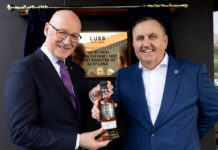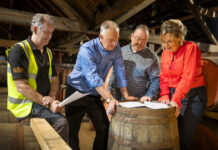Operators can work with nation’s spirits brands to educate bar staff

IT’S the home of the brave, football and golf but Scotland can also boast being the home of distilling, at least in the UK.
There are more distilleries per head of population in Scotland than any other nation in the UK. The country is also responsible for 70% of British gin production, while Scotch whisky accounts for around a quarter of the UK’s food and drink exports.
With such an embarrassment of liquid riches on Scottish operators’ doorsteps, spirits firms told SLTN one of the best ways to exploit the opportunity is by working with brands to improve both a bartender’s ability to upsell Scottish spirits and drive demand on the other side of the bar.
And this can be done by holding tastings in pubs and bars as well as taking advantage of the training offered for on-trade staff by spirits producers.
Lara Williams, marketing and events manager at Stirling Gin, said: “Tasting events are a sure fire way to sell more brands on-site.
“Venues can introduce new spirits or revitalise existing spirits by offering in-depth tastings, masterclasses and cocktail experimentation to interested consumers.
“Stirling Gin will soon have a distillery where we will be able to offer concentrated distilling training as well as a broader series of classes on gin and how it can be used in the on-trade.”
Scott Dickson, marketing manager at Loch Lomond Group, producer of Loch Lomond Whiskies, agreed with that approach, saying demand could be capitalised on with promotions and brand-led training for bar staff.
Bespoke industry training to help upsell whisky can also help operators keen to tap into the trend.
He said: “Single malts continue to perform well as consumers seek out experiences, but operators can help to maximise sales through targeted promotions such as malt of the month and whisky flights to encourage trial of new brands or expressions.
“Bespoke industry training to help upsell whisky can also help operators keen to tap into the trend [for Scottish spirits].
Dickson added that Loch Lomond Whiskies “regularly engages with on-trade staff both at venues and at the distillery” to train them on its brands.
Licensees working in concert with distilleries was further reinforced as a sound way of improving a bar’s offer by Stephen Kemp, managing director at Orkney Distilling, the maker of Kirkjuvagr gin.
“In-bar tastings, meet the maker events and indeed invitations to visit the distillery are all proven sales drivers,” he said.
“We’d encourage those in the trade to make contact, as small Scottish producers like us are keen to collaborate with the trade.”
Glasgow-based gin distillery, Crossbill, also actively encourages bartenders to visit its facility and learn about its products.
In-bar tastings, meet the maker events and invitations to the distillery are proven sales drivers.
Jonathan Engels, founder of Crossbill, said that while the company sells tickets to a gin school at the distillery for the public, trade staff can attend free of charge.
However, when looking at what can be done without external assistance to help enhance a bar’s takings from Scottish spirits, best practice with social media and, again, giving bar staff a command of some facts about the distillates behind them helps turn them into persuasive spirits advocates, according to David King, sales director at Red Door Gin, which is produced at the Benromach distillery in Forres.
He said: “The first point of contact with consumers may be on social media; here brand recognition can be built by sharing the brand story and its provenance.
“Building this connection online helps increase awareness of the brand for on-trade outlets.”
“Giving staff the confidence to talk in-depth about the brand with consumers will also help with upselling.
“Bartender recommendations and knowledge is a powerful motivator for customers to try a new product.”























